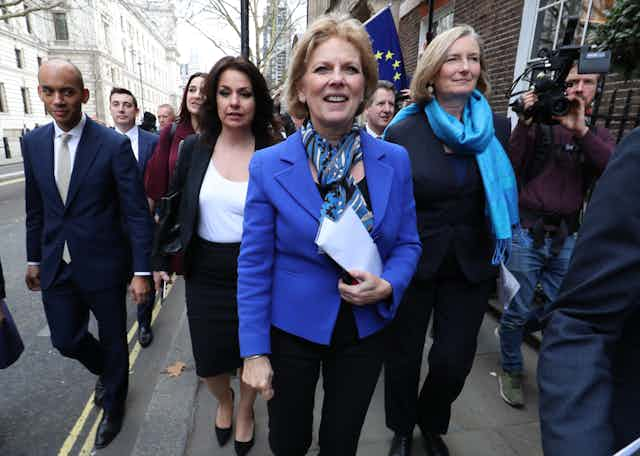To paraphrase a historical figure who still seems to tower over everything in British politics – the villainous hero Winston Churchill – the formation of the new Independent Group (IG) is not the beginning of the end of the Brexit saga, but it is perhaps merely the end of the beginning.
That is to say, after three years of referendum-induced turmoil, there is finally a new move, a brave move, by the eight Labour MPs and three Conservative MPs (and counting). Decrying that “politics is broken”, these MPs have left their parties and joined a new group – crucially, a group and not a party – that is trying to chart out a different way of doing politics in Britain.
Interestingly, and perhaps infuriatingly for many Remainers, this group is silent on what exactly that different way will be based on. Worse, it doesn’t have a clear, shared position on Brexit, the biggest issue of the day. There are no policy announcements, no real statement of principles, and there is no leader or political platform. And yet, this policy-free political movement is of incredible political importance. This is the first stone laid on a very dramatic new direction for Brexit Britain.
In the first instance, this is because these MPs represent a concept we use often in the study of social movements at my university: this is an act of direct action, based on the concept of prefiguration. That is, the actual policy statement at the heart of the formation of this movement is the formation of the movement itself. There is no need for grand policy statements right now.
In other words, this very public, very dramatic act is both a clarion call for a different politics and at the same time a concrete example of how to go about moving towards it. That is, as seven became eight, and eight became 11, it is first and foremost a cry to the very many MPs dismayed by Brexit and the constitutional logjam it had engendered. The defecting MPs are telling their colleagues “this is our way out. There is an alternative”.

And this is important: the reason they have explicitly said they are not a party yet is that this is not the creation of something that replaces an MP’s original party membership. The tribalism endemic to British politics means that if you have served one party your entire life, the idea of joining another is near-unthinkable. The IG in this has provided a different way out – and one which could even be temporary, allowing for MPs to rejoin their original party (although that would require some dramatic changes in the two main parties – and at least one of the defectors has said she won’t consider rejoining).
This act of prefiguration is an example to voters too: the tribalism outlined above is no less strong in the British voting public. If you have voted Labour or Tory your entire life, if you have in recent years voted Liberal Democrat, or UKIP – and felt badly let down by them afterwards – then the idea of voting for a new party is also incredibly difficult. Voters are also aware that a new party will find it nigh on impossible to make a dint at the next general election. The IG says again here: there may be an alternative – come and vote for a group that for now says only “enough is enough”.
Breaking the duopoly
There are other huge statements being made in the formation of this group. It says in general – though again not explicitly – that the Labour-Conservative duopoly is no longer working. It says that the nation is paralysed by Brexit and needs massive reform. Again, the IG’s creation is the first step.
It is also a huge statement to the hard Brexiteers in general – and particularly to the ERG and the no-dealers. With the defection of the three Conservatives, and the potential of more, Theresa May is losing her outright majority in the House of Commons. If she does lose it, she is ever closer to either a general election or to losing a motion that calls for a delay to the Brexit process, or worse, a motion for a second referendum.
The ERG must be acutely aware of this: more Tory defections, the growth of an IG that may garner such a significant number of votes in any election that it could hold significant, pro-Remain sway in any new parliament, means a level of turmoil in the Commons that is a threat to Brexit, full stop.
And to Leavers more broadly, extreme or otherwise, the implicit message of the creation of the IG is as clear as can be: this is a response to a Brexit process that has gone disastrously wrong, bungled by the government and the opposition with equal ineptitude. Whether they state it openly or not, the IG would not exist without this Brexit disaster, and Leavers must know that eventually, this will be a force for either Remain, or for the very least, the softest Brexit of all.
In this sense, we shouldn’t be too worried at this stage about the exact policy details of what this group wants – nor should we dismiss them as irrelevant because they will not give us that detail yet. Rather, we should view this through the lens of direct action, as an act of prefiguration: the act of creating the group will hopefully prefigure the way forward out of this Brexit farrago, however that way will eventually to be constructed.

